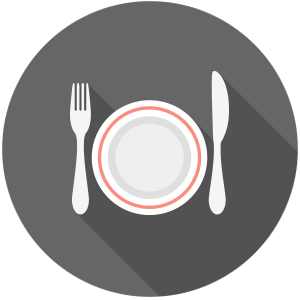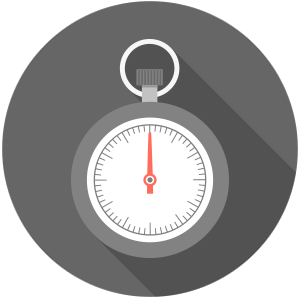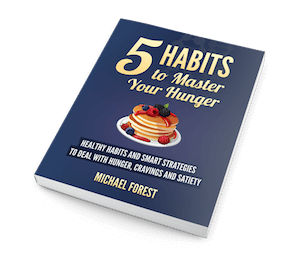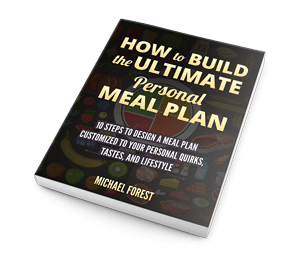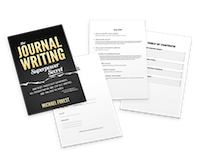Mastering Your Hunger & Dealing with Metabolic Compensation
Introduction.
Habit 1.
Habit 2.
Enjoying the Guide?
Get the Revised and Expanded Edition (available now on Amazon)
New Sections
3 Key Principles (...About Your Hunger and Cravings)
"Am I In the 'Sweet Spot' of Hunger?" Assessment Guide
8 Factors Affecting Your Ability to Assess Your Own Hunger
"Do I Need a Cheat Meal?" Assessment Guide
Raise your hand if these sound familiar:
- You try to diet, and you're super strict and everything's great, but eventually you find the hunger and cravings are just too much. They're distracting, annoying, and take up too much mental space. It's like a dead-end.
- You lose weight only to gain it all back (a.k.a. “yo yo” dieting).
- You have lost weight, and you have kept it off, but it just seems like so much extra work relative to what other people can “get away with.”
There are reasons for all these things.
It's called metabolic compensation (or setpoint regulation, depending on context).
Metabolic compensation is not just “oh, your metabolism is a bit slower now.” That's too simplistic, because metabolism is not just “energy in, energy out.”
To quote Dr. Diana Schwarzbein, “You are your metabolism.”
To quote Dr. Schwarzbein again “Metabolism is the totality of all the chemical actions and interactions that are constantly occurring in your body.”
In other words, your “metabolism” is a combination of bio-chemical processes related to energy metabolism, your own energy levels, your hunger, cravings, concentration and mental focus, and a bunch of other things. Your metabolism is not some ~mysterious unknowable force~ …but it ain't “just” a one-dimensional cals-in/cals-out calculation, either. The calories are a very useful exchange value, but they won't paint a complete picture, at least not when it comes to health, your habits, your brain, your hunger, your hormones, and so on.
What is metabolic compensation?
People who have lost just 10% or more of their body weight experience a 15% drop in metabolism beyond what you’d expect based on their new body composition. That works out to, on average, around 300-400 calories per day.[1] [2] [3]
This means that if a 250 lb. man loses just 25 lbs., or a 160 lb. woman loses just 16 lbs., they’ll each have their metabolism decreased by several hundred calories each and every day.
…but their hunger will increase relative to what you’d expect!
Former Biggest Loser contestants are starting to find this out for themselves. [4]
Talk about suuuuuck.
Why? The short answer is that dieting results in huge, sustained drops in the hormone leptin [5] and drops in leptin result in more hunger and a decreased metabolism.
Leptin is a master hormone, so it affects a bunch of other hormones, such as ghrelin (known as the “hunger hormone”). This is a double whammy of suck if you’re trying to lose weight and keep it off.
In other words: if you lose weight, your body will tell you to eat more than you should. In order to feel “full,” you would have to eat more calories than you really need to, and this will result in weight gain.
This sucks.
There's no way around that fact. It just plain sucks.
I know how much this sucks. I’ve lost over 100 lbs. and have kept it off for over a decade. “Hunger” is just something I had to deal with.
You can't get around that, but that doesn't mean there aren't thing you can do — pro-actively.
An unfortunate truth is that you can’t rely on willpower alone, because willpower is a limited, finite resource. Use it all up, and eventually you will give in to whatever you are craving. There are times when you’re tired. Your brain has trouble getting the glucose it needs to think straight and help you make the empowered decisions you want to be making.
Also, using up your willpower will make you cranky, irritable, and less able to use your brain. Your relationships suffer, your work suffers, and on and on, because it turns out you need a certain amount of willpower and self-control in almost every area of your life. Using it all up because of hunger and cravings will have ramifications in all those other areas.
Relying solely on willpower is a bad strategy.
Obviously sometimes you might have to use your willpower (duh – that’s life), but you should always plan or strategize in such a way that you have to rely on as little willpower as possible.
Make things easier.
Set up systems and habits that serve as safety nets for those times when your willpower just isn’t at its peak (e.g., the end of a long stressful work day, or right after you’ve been hit with bad news and an emotional gut punch).
No one loses weight and sustains that weight loss with willpower alone. (People always think they do, but usually that’s because it makes them feel good to think so. They ignore things like the environmental factors they had going for them, or anything else external to themselves. Everyone is guilty of this, pretty much. Yes, I am as well.)
I didn’t have that much willpower. I still don’t. No one does.
Here, burn this into your mind:
Success is about strategically developing good habits that deal with the inevitable, physiological consequences of dieting.
In order to lose weight (and keep it off) while not going totally ****ing bonkers, I’ve had to come up with personal strategies that can:
- Reduce your physical hunger
- Reduce your mental cravings
- Increase your metabolism
The strategies in this guide focus on #1 and #2, though they will have an effect on #3. (I just haven’t focused on it as much in my actual explanations.)
What if you could get rid of your hunger and cravings? What if you had a set of proven strategies that could help you get rid of both real, physical hunger, as well as the mental cravings that creep up on you at the worst times (i.e. when your willpower is at its lowest, and you’re at your most vulnerable)?
In this book you’ll learn some important truths about hunger, as well as some tested (though sometimes counter-intuitive) strategies you can implement right now to decrease your own hunger. (Some of the strategies, by the way, are very fun.)
There are five overarching habits to this guide. Here they are:
- Eat in a way that trains your stomach and mind to only be hungry when it’s time to eat
- Eat foods that satiate YOU
- Implement well-timed, huge calorie spikes
- Take advantage of the “sweet spot” of hunger
- Pick and choose from a selection of these other assorted weirdo tips, based on your lifestyle.
If there any “key” truths about hunger I think it important to get across, it’s that hunger is both a physical and a mental phenomenon.
Sometimes your hunger is just “all in your head,” and sometimes it’s in your stomach. Sometimes it’s both. Sometimes one leads to the other, then back again, so that they mutually reinforce each other.
These two “types” of hunger often overlap, intersect, and complement each other, so it is important to implement strategies that take total control of both of them.
This guide gives you those strategies.
Enjoying the Guide?
Get the Revised and Expanded Edition (available now on Amazon)
New Sections
3 Key Principles (...About Your Hunger and Cravings)
"Am I In the 'Sweet Spot' of Hunger?" Assessment Guide
8 Factors Affecting Your Ability to Assess Your Own Hunger
"Do I Need a Cheat Meal?" Assessment Guide
.
.
.
Introduction.
Dealing strategically with hunger, cravings, and metabolic compensation.
Habit 1.
Eat in such a way that you train both your stomach and mind to only be hungry when it’s time to eat.
Habit 2.
Pick (and combine) foods that satiate YOU.
